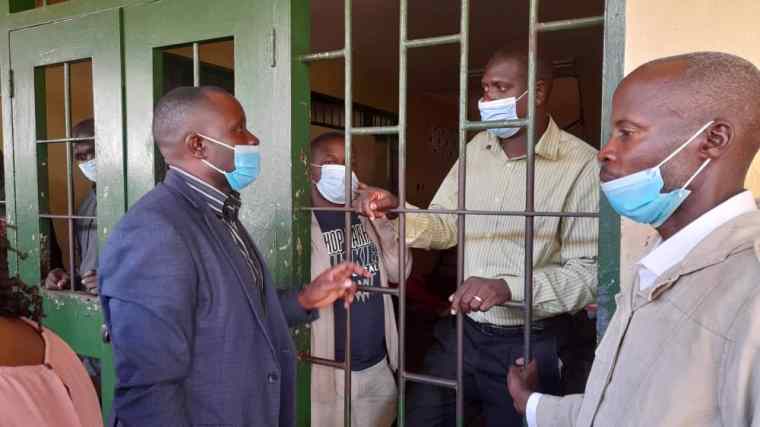Nairobi, June 9, 2021— Ugandan authorities should drop the criminal libel charges against journalists Pidson Kareire and Darious Magara, and reform the country’s laws to decriminalize speech, the Committee to Protect Journalists said today.
On May 27, the Buganda Road Chief Magistrate Court in Kampala, the capital, charged Kareire and Magara with criminal defamation and ordered them to be detained until a bail hearing on June 17, according to a copy of the charge sheet, which CPJ reviewed, and a statement by the Human Rights Network for Journalists-Uganda (HRNJ-U), a local press rights group.
The charge sheet alleges that, between October and November 2020, Kareire, managing editor of the privately owned news website The Drone Media, and Magara, managing editor of the privately owned news website The East African Watch, published articles that included defamatory claims about Dott Services Limited, a Ugandan infrastructure company.
If convicted, they could face up to two years in prison, according to the charge sheet and the Ugandan penal code.
“Ugandan authorities should drop the criminal libel charges against journalists Pidson Kareire and Darious Magara,” said CPJ’s sub-Saharan Africa representative, Muthoki Mumo. “Democracies around the world have eschewed criminal remedies for defamation, and this case shows the urgent need for Uganda to reform its laws in line with international and regional standards.”
The journalists’ charge sheet cites an October 27 report by The East African Watch which alleged that Dott Services Limited had a poor work record and questioned a government decision to grant the company a road contract. The sheet also cites a second report about the company, which CPJ could not find in The Drone Media or The East African Watch. CPJ did find a November 5 report by The Drone Media quoting a legislator who made similar allegations about the company. An April 1 article published by The Drone Media said that Kareire had been summoned by police in connection to that November 5 report.
In response to requests for comment submitted via email and through Dott Services Limited’s website, CPJ received an emailed statement by Byamugisha Gabriel & Co. Advocates, a law firm, which said it represented the company. The firm said that the company had filed a criminal complaint following the publication of “highly libelous” statements by both journalists.
The statement also accused Magara and Kareire of “blackmail and extortion,” alleging that they offered to stop publishing negative stories in exchange for payment. It alleged that the articles were “designed with intent to alienate [Dott Services Limited] from fair competition.”
Diana Nandudu, the legal aid program officer at HRNJ-U, who is coordinating the journalists’ representation, told CPJ via messaging app that she was not aware of those extortion allegations, and said they had not been presented in court.
Police initially summoned the journalists to appear for questioning at the Criminal Investigation Department headquarters in Kibuli, a neighborhood of Kampala, on April 6, according to documents seen by CPJ and reports by The Drone Media and The East African Watch.
Kareire responded to that summons on April 20, and police questioned him about the libel allegations and released him later that day; Magara responded to the summons on April 26, and was also questioned and released, according to those sources.
Following their release, police ordered Magara and Kareire to report to the Criminal Investigations Department headquarters on a weekly basis, according to Nandudu. When they reported for one of their scheduled appearances on May 27, police detained them and brought them to court, where they were formally charged, Nandudu said.
The statement from Byamugisha Gabriel & Co. Advocates said that Dott Services Limited had no role in the journalists’ cases after filing the complaint, other than acting “as requested by the office of the DPP [Director of Public Prosecutions].”
Irene Nakimbugwe, the deputy spokesperson for the public prosecutor’s office, told CPJ by phone that charges had been filed against Magara and Kareire after authorities collected “credible evidence” that they had committed criminal libel. Nakimbugwe declined to discuss the case further, saying that it was up to the courts.
Police spokesperson Fred Enanga asked CPJ to direct queries and concerns to the office of the Inspector General of Police. CPJ tried to reach Inspector General Martins Okoth-Ochola by calling the police headquarters in Kampala; an officer who answered referred CPJ to Ochola’s assistant, Fred Mirondo.
When contacted by CPJ, Mirondo asked that questions and concerns be sent over email. In a phone call on June 4, Mirondo acknowledged receipt of that email but referred CPJ to the head of the Criminal Investigations Department, Grace Akullo, for comment.
CPJ repeatedly called Akullo and texted her for comment, but she did not respond.
Separately, Charles Twiine, the spokesperson of the Criminal Investigations Department, told CPJ via messaging application that “being a journalist does not give a ticket to immunity” but declined to comment on the specifics of Magara and Kareire’s case.
Kareire was previously charged with criminal defamation in 2019, as CPJ documented at the time. Daniel M Walyemera, Kareire’s lawyer, told CPJ that the case was pending at Uganda’s High Court as of this month.
In 2009, Uganda’s constitutional court upheld the country’s criminal libel law, arguing that it was in the public interest; an application challenging that law at the East African Court of Justice, a regional judicial body, was dismissed in November 2020, according to copies of the two judgments reviewed by CPJ.
